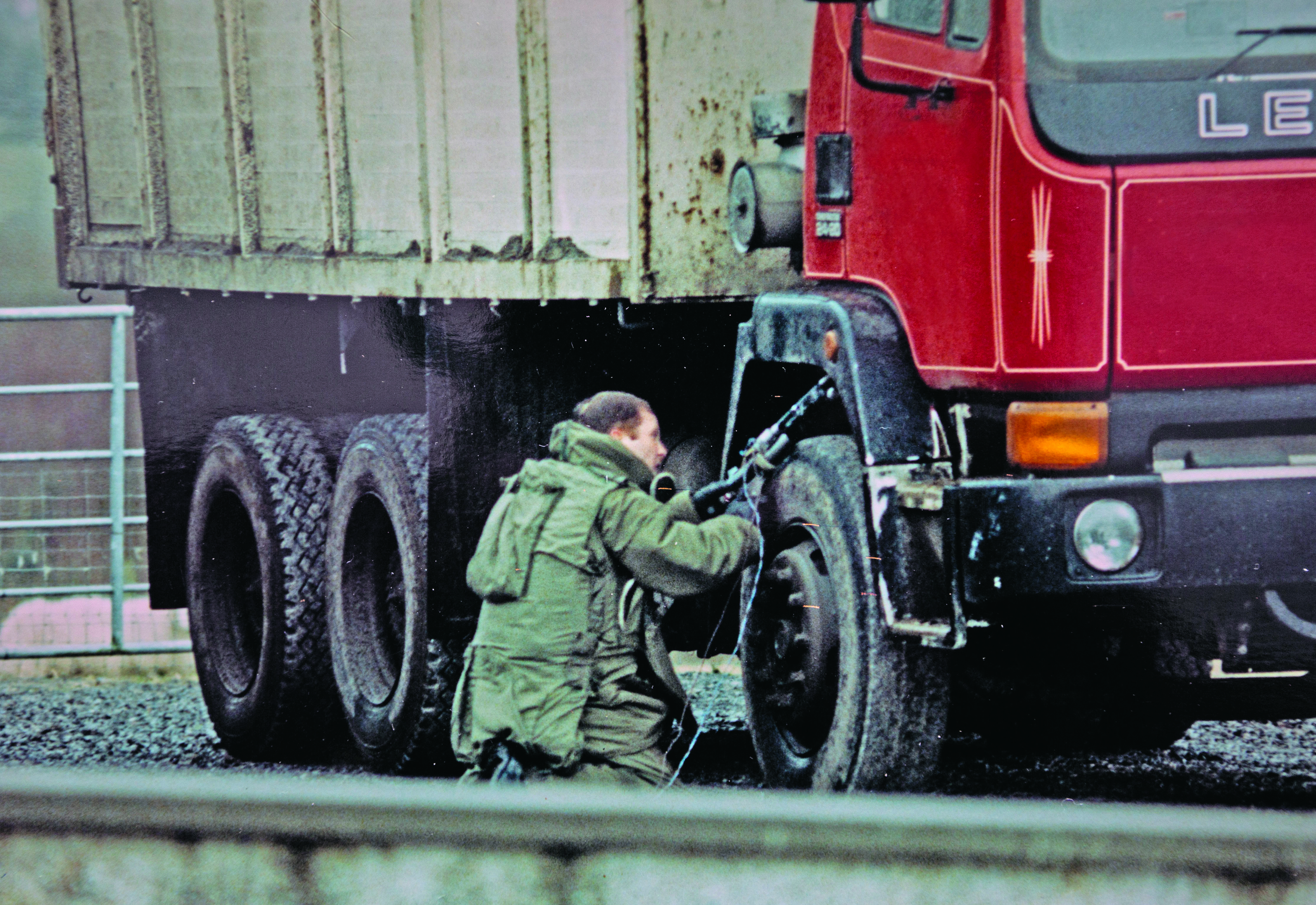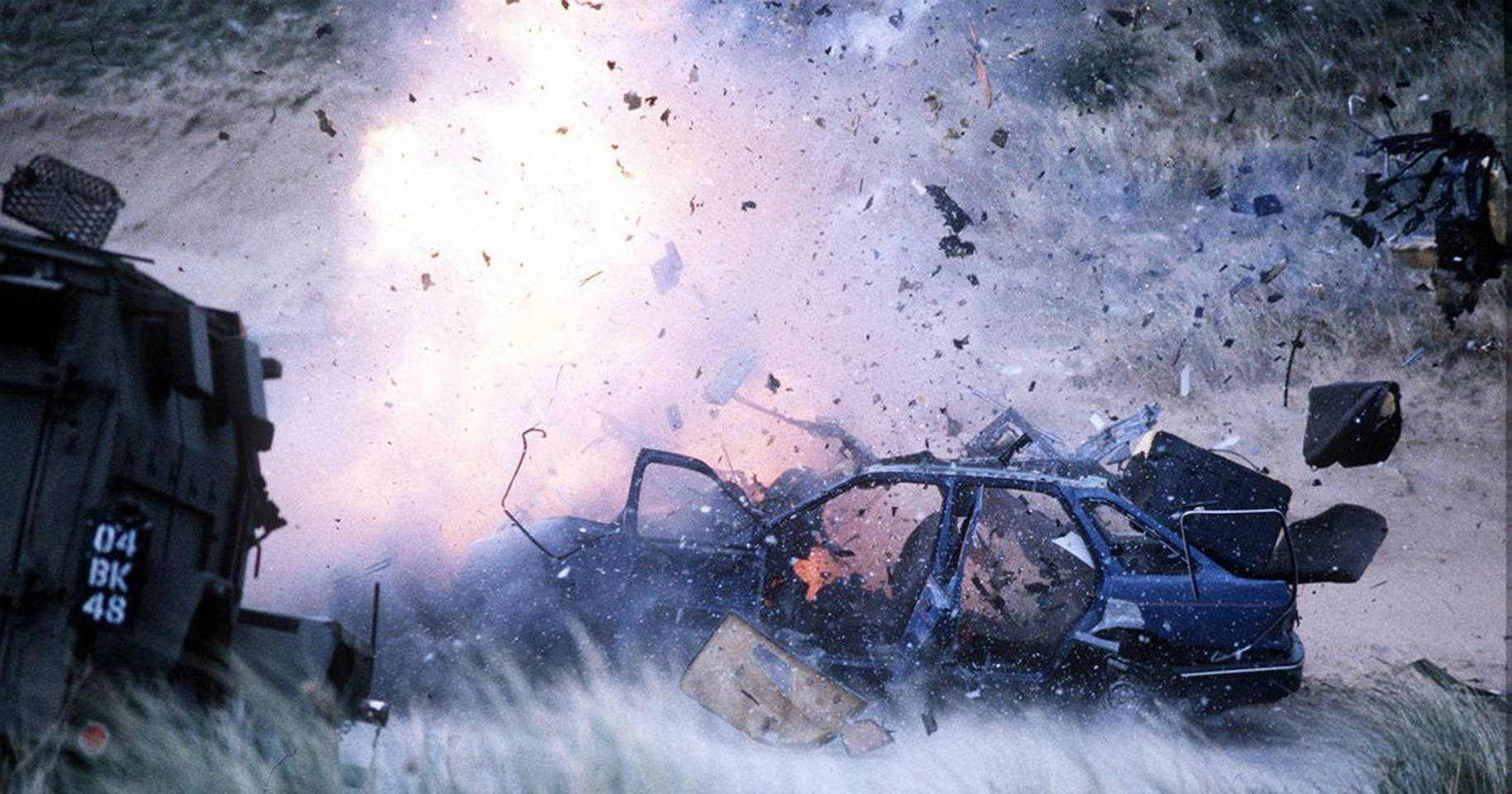
IT was a big bomb. In fact, the 3,000lb of booby-trapped explosives loaded into a stolen Toyota pickup at a border crossing was the biggest ever planted in Northern Ireland.
Alone and, after mechanical problems, without his remote control robot used to disarm bombs at a distance, Alan Islam had to take it apart.
Warrant officer Islam took eight hours to do it. And he still remembers every minute.
He said: “It was dark, cold, wet and miserable. Without the assistance of my wheelbarrow [the robot], it was going to be a long and difficult night.
“But I was the team leader and it was my job. At a time like this, you don’t know what you are walking into.loo
“All you do is focus on the job and hope you get everything absolutely right.” His calm, effectiveness under intense, unimaginable pressure earned him the Queen’s Gallantry Medal.
Working to disable high explosives was a million miles from his first job as a warehouseman at a builders’ merchant in Dundee.
He had left school before 16, desperate to spread his wings and leave exams to others.
While he excelled in stock control he soon realised he couldn’t bear to spend the rest of his working life storing and counting tiles, grout and cement.
As a young cadet soldier, the Army was a natural choice.
He passed the entrance exam with flying colours with hopes to become an engineer or technician.
“Maybe even my warehouseman experience would come in handy,” he said.
“But there were no openings at all and I was selected to be an ammunition technician and was trained to look after weapons and bombs.
“I had gone into the Army never wanting to be a bomb disposal officer.
But the Army had different ideas.
“I was encouraged to sit the bomb disposal exams but struggled and took three goes to get through.
“I felt I was surrounded by people that were much smarter. Much cleverer. But in truth, few passed first time. Looking back, that was all part of the training to see how easily you would give up.”
Later on after disabling a bomb under the M6 in Birmingham in 1997 Alan was awarded the George Medal.
The high explosives had been planted under an elevated part of the motorway.
Crawling under the road to get to the bomb meant abandoning his protective bomb disposal suit and safety helmet. His Army fatigues were all that stood between him and oblivion if it went wrong.
“I never thought I would get through it,” he said. “The trouble with the bomb disposal is that you never know when you will.
“To get to the high explosives I had to climb scaffolding.
“As I approached it I said, ‘Please God, let me get this right.’
“Climbing up the scaffolding, I thought, ‘if I fall off now I’m going to look pretty stupid’.”
It took 12 hours to disable the two five-pound bombs and make the motorway safe.
“I felt the police officers searching the carriageways and bridge for other bombs were braver because they had no training.
“I will never see myself as particularly brave.”
Back as a teenage soldier he remembers being assigned with other bomb disposal new recruits to dig the garden of an Army widow.
Her husband had been killed by a bomb.
“As she handed us a tray of juice I could see her look at us and wonder how many of us would survive.
“The lad sitting next to me later died while disabling a device.”
After 23 years in the Army, including 15 in active bomb disposal, he has retired to a desk job with the MoD.
But Alan has a new life goal – supporting his daughter through her brave battle with cancer.
His courageous attitude is something he has passed on to his daughter, Mandy, who is also in the Army.
Mandy, 39, an Army Major, is continuing to battle a rare blood cancer.
And she is not only facing her illness head on, but she is inspiring and supporting others by setting up a social media account called the Cancer Warrior Diaries and is now writing a book on her fight to live.
Both father and daughter are appearing together in an acclaimed series of portraits of British forces heroes by former shipyard worker turned artist, Tom McKendrick to be exhibited in November.
But for now, father and daughter are focused on getting Mandy well again; and Mandy wants to help other people at the same time.
“It’s my mission to help people take charge of their cancer and not let it control them,” she said.
“Meet it face on and accept it then work with the doctors who treat you.
“If you become a victim, you stop being a person.
“I would not change my cancer for the world because it has given me a level of vision and a thirst for positive change I would never have had.
“I am staring down the barrel of a gun but I am strong enough to face that,” she added.
She is fostering a sense of community through adversity in the military and beyond.
Her diaries inspire, encourage and instil confidence in other cancer patients globally, to accept their diagnosis and meet it.
Mandy hopes her book and social media posts will help most and she wants anyone to get in touch.
In her 21 years in the British Army she has served in Afghanistan, Iraq, Bosnia and Northern Ireland.
The Royal Army Medical Corp major is now undergoing further treatment after the cancer recurred.
Alan added: “My wife June and I are in awe of how positive Mandy continues to be throughout treatment… and how much she inspires others. I am a big softie a heart. I am a dad.”
Alan and Mandy Islam, will feature in an exhibition to be unveiled in Cydebank in November.

Enjoy the convenience of having The Sunday Post delivered as a digital ePaper straight to your smartphone, tablet or computer.
Subscribe for only £5.49 a month and enjoy all the benefits of the printed paper as a digital replica.
Subscribe